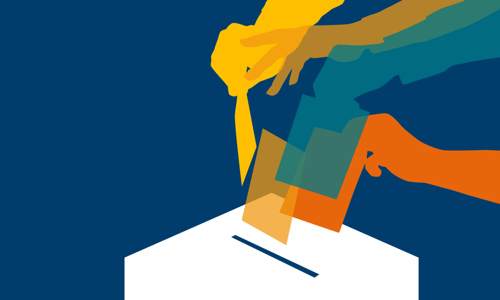With the presidential election less than two months away, UC Santa Cruz faculty members, in conversation with policy advocates and community organizers, plan to provide insights into the critical issues facing our time and how we arrived to this point.
The UC Santa Cruz Institute for Social Transformation and University Forum are organizing a free online series of conversations on the topic “Elections: What are They Good For?” beginning Sept. 15. The four-part series, subtitled “Democracy, Dilemmas and Decisions,” will address how social movements on the left and right have shaped what is at stake in the election, what institutional barriers to democracy exist in America’s political system, and how patterns of civic engagement are influencing the election.
Those who watch the talks should expect a facilitated conversation on the issues, rather than speakers giving presentations, said Chris Benner, the moderator of the event and the director of the Institute for Social Transformation.
“What we want to do in this series is step back a bit and put the elections in a bigger context,” Benner said.
The talks will be shown over Zoom, which Benner hopes will give viewers a feeling of closeness and connection to the speakers.
“You’re not sitting in the back of an auditorium,” he said. “Our goal is to make it intimate.”
The discussions are scheduled 5:30–7pm. Sept. 15, Sept. 23, Oct. 5, and Oct. 19. The first two sessions will focus on national issues while the last two will center on California. Read on to learn about each talk:
- Sept. 15-“Hope, Fear and Desire for Democracy on the Eve of an Election.” This session will examine how broader democratic energies and social movements have shaped this election. Discussion topics will include the social reaction to the first black President and how it led to mobilization of conservative white supremacists, the Tea Party and finally the Trump phenomena. There will also be discussion of the Black Lives Matter movement, Latino political movements, and the influence of shifting demographics on the election process. Featuring Dean Mathiowetz, UC Santa Cruz associate professor of politics; Deborah Gould, UC Santa Cruz associate professor of sociology and Cristina Beltrán (Porter ’92), associate professor at New York University.
- Sept. 23- “Elections, the Constitution, and Institutional Reform." This session focuses on the institutional constraints on democratic voice, and related efforts to expand political participation. Expect to hear about efforts to limit gerrymandering, the movement to have Electoral College votes reflect the popular vote, proposals to limit Supreme Court justice terms, and how adding new U.S. states like Puerto Rico or Washington, D.C. would impact the Senate. Featuring Daniel Wirls, UC Santa Cruz professor of politics and Kathay Feng, national redistricting director of Common Cause, an organization fighting for accountable government, equal rights and opportunities for all.
- Oct. 5—“California: Changing Demographics, Youth and Integrated Voter Engagement.” This discussion will focus on Latino and youth voters and how community organizations and nonprofits are working to increase voter turnout in their areas. Featuring Veronica Terriquez, UC Santa Cruz associate professor of sociology; Randy Villegas, UC Santa Cruz Ph.D. candidate and Martin Higuera, community activist.
- Oct. 19—“California: Our Criminal Justice System and Political Possibilities.” Panel participants will examine the “defund the police movement” in the context of broader movements to deinstitutionalize people who have been convicted of crimes in California. The discussion will also cover three related Voter-initiated Propositions on the November 2020 ballot: Prop 17 which would restore right to vote for people convicted of felonies who are on parole; Prop 20 which restricts parole for nonviolent offenders; and Prop 25, a referendum to overturn a 2018 law that replaced money bail system with a system based on public safety. Featuring Craig Haney, UC Santa Cruz professor of psychology and Anjuli Verma, UC Santa Cruz assistant professor of politics.
Benner said he hopes those who attend the talks will come away more thoughtful, more educated, more aware of the importance of civic engagement.
“I hope it helps motivate people to get involved,” he said, “One- to vote, but two, to recognize that voting is only one of the many ways that we need to be engaged to strengthen and improve our democracy.”
The talks are free and open to the public. Registration is available online.



